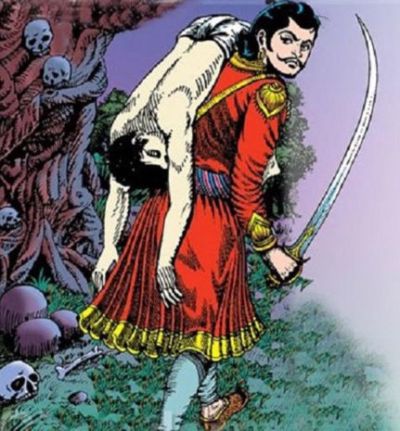Read the previous part here...
Dīrghadarśin however, continued to work responsibly, shouldering the king’s duties as well as his own. He worked relentlessly day and night, upto a point when rumors started floating around the kingdom that the minister was the one who had set the king on wayward ways, so that he could usurp all the power for himself.

इत्य् उत्पन्ने महत्य् अत्र जनवादे ऽथ गेहिनीम् ।
स्वैरं मेधाविनीं नाम दीर्घदर्शी जगाद सः ॥ १२,१९.११ ॥
प्रिये राज्ञि सुखासक्ते तद्भारं वहतो ऽपि मे ।
राज्यं भक्षितम् एतेनेत्य् उत्पन्नम् अयशो जने ॥ १२,१९.१२ ॥
लोकवादश् च मिथ्यापि महताम् इह दोषकृत् ।
तत्याज किं न रामो ऽपि जनवादेन जानकीम् ॥ १२,१९.१३ ॥
तद् अत्र किं मया कार्यम् इत्य् उक्ते तेन मन्त्रिणा ।
भार्या मेधाविनी धीरा सान्वर्था तम् अभाषत ॥ १२,१९.१४ ॥
तीर्थयात्रापदेशेन युक्त्यापृच्छ्य महीपतिम् ।
कंचित् कालं विदेशं ते गन्तुं युक्तं महामते ॥ १२,१९.१५ ॥
एवं ते निःस्पृहस्यैष जनवादो निवर्त्स्यति ।
त्वय्य् अस्थिते ततो राज्यम् उद्वक्ष्यति नृपः स्वयम् ॥ १२,१९.१६ ॥
ततश् चास्य शनैर् एतद् व्यसनं हानिमेष्यति ।
आगतस्यात्र निर्गर्हा भवित्री मन्त्रिता च ते ॥ १२,१९.१७ ॥
इत्य् उक्तो भार्यया गत्वा दीर्घदर्शी तथेति सः ।
कथाप्रसङ्गे तं भूपं यशःकेतुं व्यजिज्ञपत् ॥ १२,१९.१८ ॥
अनुजानीहि मां राजन् दिवसान् कांश्चिद् अप्य् अहम् ।
व्रजामि तीर्थयात्रायै धर्मो हि प्रेप्सितः स मे ॥ १२,१९.१९ ॥
Disturbed at this rumor, Dīrghadarśin called his wife Medhāvatī aside one night, and said…
“My dear, you know how the king is addicted to wine, women and pleasure. I have taken on all his responsibilities, so that the kingdom does not suffer, but now there is a rumor that I have done this on purpose, so that I can usurp the throne.”
“You know, my dear, that a rumor, even if false, can affect the greatest of men. Was not Rāma compelled to abandon Devi Sītā just because of a rumor?”
“Do tell me, my dear, what do you think I should do now?”
His wife Medhāvatī was known for her intelligence and presence of mind. She said…
“I understand your dilemma, my dear. Tomorrow, approach the king and tell him that you wish to undertake a pilgrimage for a few days. This will lead to two things. One – people will understand that you are not after power, and you were merely discharging your duties, and so the rumor will die a natural death.”
“Two – in your absence, the king will be forced to attend to his duties, and this will keep him busy, and hopefully help him get rid of the pleasure-seeking habits that he has fallen into.”
“When you return, you can take up your responsibilities once again, and all will be well…”
Dīrghadarśin agreed that this was the best course of action, and said that he would approach the king to ask for a leave of absence.
The next day, Dīrghadarśin spoke to the king and said “O dear king! I have been thinking for a while. I am old now and I feel that it is time for me to perform some religious duties. And so, do permit me to go on a teerth yātra (pilgrimage) for a few days…”
तच् छ्रुत्वा सो ऽब्रवीद् राजा मैवं तीर्थैर् विना परः ।
दानादिः किं न धर्मो ऽस्ति स्वर्ग्यस् ते स्वगृहेष्व् अपि ॥ १२,१९.२० ॥
अथावोचत् स मन्त्री तम् अर्थशुद्ध्यादि मृग्यते ।
दानादौ नित्यशुद्धानि तीर्थानि नृपते पुनः ॥ १२,१९.२१ ॥
यावच् च यौवनं राजंस् तावद् गम्यानि धीमता ।
अविश्वास्ये शरीरे हि संगमस् तैः कुतो ऽन्यदा ॥ १२,१९.२२ ॥
इति तस्मिन् वदत्य् एव राज्ञि चैवं निषेधति ।
प्रविश्यात्र प्रतीहारो राजानं तं व्यजिज्ञपत् ॥ १२,१९.२३ ॥
देव व्योमसरोमध्यम् अंशुमाली विगाहते ।
तद् उत्तिष्ठत सैषा वः स्नानवेलातिवर्तते ॥ १२,१९.२४ ॥
श्रुत्वैतत् सहसा स्नातुम् उदतिष्ठन् महीपतिः ।
यात्रोन्मुखः स मन्त्री च तं प्रणम्य गृहं ययौ ॥ १२,१९.२५ ॥
तत्रावस्थाप्य भार्यां ताम् अनुयात्रानिवारिताम् ।
स प्रतस्थे ततो युक्त्या स्वभृत्यैर् अप्य् अतर्कितः ॥ १२,१९.२६ ॥
The king was shocked. “Dīrghadarśin, you cannot go away, even if it is for a little while. There is so much to do! Rather than traveling to far-away lands for a pilgrimage, can’t you perform some daana (charity) here itself, so that it leads to punya (religious merits)?”
Dīrghadarśin replied “You are right, my king. Daana can be done here too. But a pilgrimage to the holy Ganga and other sacred places brings moksha, or liberation.”
“I will have to do this while I can, for there is no guarantee that I will be able to perform this yātra later in life…”
The king refused to relent, and as they were speaking, the king’s attendant entered and said “My king! The sun is rising slowly from the waters of the lake, and so your time of taking the holy dip is passing. Please come with us now…”
The king readily agreed, seeing this as an opportune moment to leave the discussion that he did not want to have in the first place. Dīrghadarśin bowed and took his leave, and went home.
When he reached there, he packed his bag, forbade his wife to follow him, and set out in secret, without even his servants knowing of his departure….
to be continued…
